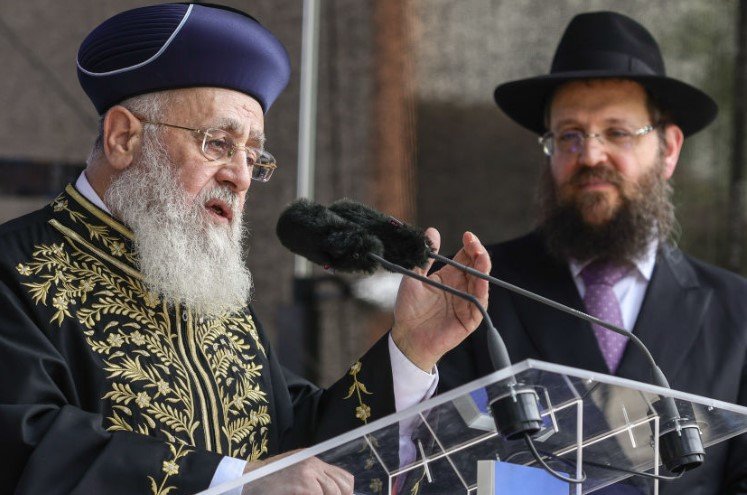Former Sephardi chief rabbi Yitzhak Yosef sparked outrage on October 26, 2025, by calling Rabbi Tamir Granot a heretic for urging ultra-Orthodox Jews to join the Israeli Defense Forces. Granot, who lost his son in battle shortly after the October 7 Hamas attack, has pushed for haredi enlistment amid ongoing debates over military service exemptions in Israel.
This public attack came during a radio broadcast, where Yosef suggested he would not count Granot in a prayer quorum. The incident highlights deep divisions in Israeli society over haredi draft laws, especially as the country faces security threats from multiple fronts.
Background of the Dispute
Yitzhak Yosef, a key figure in the Shas party, has long opposed forcing haredi men into the army. He argues that Torah study is vital for Israel’s protection. In his recent comments, Yosef targeted Granot directly, questioning his status as a true rabbi.

Granot heads a yeshiva in Tel Aviv that combines religious learning with military service. His son, Captain Amitay Granot, died fighting Hezbollah on the Lebanon border in late 2023. This personal loss has fueled Granot’s calls for change.
The clash stems from broader tensions. Israel’s Supreme Court ruled in 2024 that haredi exemptions are unlawful, leading to protests and political fights. Yosef has faced backlash before, including threats to leave Israel if drafts are enforced.
Public reactions poured in quickly. Finance Minister Bezalel Smotrich condemned Yosef’s words as a desecration of God’s name. Other leaders called for unity during wartime.
Key Arguments on Haredi Enlistment
Supporters of haredi enlistment say it’s about fairness. With Israel at war, the burden falls heavily on secular and national-religious citizens. Granot has said haredi men should fight to defend the nation, just like others.
Opponents like Yosef claim military service harms religious life. They worry about exposure to secular influences in the army. Some haredi leaders see the draft as an attack on their way of life.
Recent data shows the impact. In 2025, only about 1,200 haredi men enlisted, far below government targets. The state budget allocated over one billion shekels to yeshivas, which critics say encourages draft dodging.
Here are some key points in the debate:
- Fairness Issue: Non-haredi Israelis serve up to three years, while haredim often get exemptions for study.
- Security Needs: Israel’s military faces shortages amid conflicts in Gaza and Lebanon.
- Economic Angle: Haredi non-participation costs the economy billions in lost productivity.
Polls from 2025 show most Israelis support ending exemptions. A survey by the Israel Democracy Institute found 70 percent favor haredi service.
Political and Social Fallout
Yosef’s remarks drew swift criticism from across the spectrum. Prime Minister Benjamin Netanyahu’s office called them unacceptable. Even within haredi circles, some voiced discomfort.
Shas party leaders distanced themselves slightly, but Yosef remains influential. His father, the late Rabbi Ovadia Yosef, founded Shas and shaped Sephardi politics.
The incident ties into larger events. In April 2025, haredi protests blocked roads near recruitment centers. A haredi minister faced calls to resign after dancing to an anti-IDF song.
Social media buzzed with opinions. Posts highlighted stories of haredi men enlisting despite attacks from their communities. Others shared tales of soldiers without full citizenship fighting for Israel.
This controversy could affect coalition politics. Shas has threatened to leave the government over draft laws, risking elections.
| Aspect | Supporters of Draft | Opponents of Draft |
|---|---|---|
| Main Reason | National security and equality | Protection of religious lifestyle |
| Key Figures | Rabbi Tamir Granot, Bezalel Smotrich | Rabbi Yitzhak Yosef, Shas leaders |
| Recent Impact | Court rulings force enlistment | Protests and budget fights |
| Public Support | 70% of Israelis per 2025 polls | Strong in haredi communities |
Broader Implications for Israel
The debate goes beyond religion. It touches on Israel’s identity as a Jewish state with democratic values. With ongoing wars, the military needs more troops. Experts predict that by 2030, haredim will make up 25 percent of the population, making exemptions unsustainable.
Some haredi units already exist in the IDF, offering religious accommodations. Success stories include soldiers who balance faith and service. Granot’s yeshiva model has inspired similar programs.
However, resistance remains strong. In July 2025, Yosef linked soldier deaths to less Torah study, drawing more criticism.
Balancing these views is key. Leaders call for dialogue to avoid deeper splits in society.
Looking Ahead
As Israel navigates these challenges, the haredi draft issue will likely heat up. Upcoming Knesset sessions may address new laws. Granot continues to speak out, honoring his son’s memory.
Experts suggest compromises like national service options could bridge gaps. For now, the clash between Yosef and Granot underscores the need for respect amid disagreement.
Share your thoughts on this debate in the comments below. Did Yosef go too far, or is the draft push misguided? Your input helps foster discussion.
